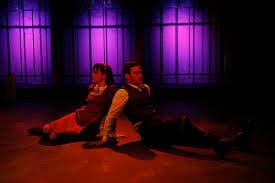Nearly 125 years ago a German dramatist penned a play that criticized the sexually-oppressive culture of his country. It offered a vivid dramatization of the erotic fantasies of young teenagers who were just discovering their bodies.
As you might expect, it was pretty controversial material. The play was often banned. More than a century later, it still raises eyebrows. And this month, it’s on stage at the Alabama School of Fine Arts. WBHM’s Tanya Ott pulls back the curtain for an intimate look at Spring Awakening.
Let’s be clear from the beginning. If you’re expecting Broadway’s Spring Awakening – the one that won 8 Tony awards including Best Musical – this is not it.
This is the seminal piece of theatre written by Frank Wedekind in 1890 and translated by Jonathan Franzen. You might recognize his name. Last year he was on Time Magazine’s cover – touted as the next great American author for a novel he wrote called “Freedom”.
This Spring Awakening is subtitled “A Children’s Tragedy” and ASFA theatre instructor Jonathan Fuller says it’s a far cry from the musical.
“I think the Broadway rock musical was a lot more salacious. This play is totally about adolescence and teen sexuality, but rather than being exploitative, it really kind of pulls back a little bit.”
There is the suggestion that one of the girls is abused by her parents. And Melchior and Wendla make love. But Fuller says not as graphically as they did on the Broadway stage.
“I swore on a stack of Shakespeare that everything we would do would be PG-13. no more than that. It might be a little challenging for a 9 or a 10th grader, certainly, but heck I’ve seen a lot worse in PG 13 movies.”
Simon Oliver plays Melchior, the intelligent kid with the more liberal mother. Melchior is very textbook smart about puberty and the human body, but he’s still trying to figure it all out in real life. Oliver says it all feels very familiar.
“I mean I’ve experienced this stuff before, you know. Not knowing what’s going on. Not understanding. Not having someone to tell you exactly what you’re feeling and why you’re feeling it. You know and having the awkward tension with the person that you like so much, you know. And wanting to ask them, but not being able. That’s something I could definitely relate to. And I think every teenage boy could relate to it.”
“You know it’s awkward when you go through it the first time and to do it again is kind of miserable. Nobody wants to go through puberty twice!” says 18 year old Selena Boyer.
Boyer plays Wendla, the young girl who sleeps with Melchior.
“My biggest challenge is mentally to go back and pretend like a don’t know what’s going on with my body and I don’t know how the world works and where babies come from and to have that innocence of the lack of knowledge because I do. I was fortunately to grow up in a home where my mother talked openly about it, here’s a book, you know read it – if you have any questions – but to go back to that state of ignorance is just hard.”
ASFA Sophomore PJ Washington plays Moritz, the young teen who comes to Melchior for answers about sex. Washington says the play really captures the emotional rollercoaster many teens experience.
“I’m from small town, Aliceville, Alabama – population 0. And we all sometimes have questions that we feel like are not necessarily societally acceptable. And sometimes we will hold our questions just because we don’t want to ask them.”
Director Jonathan Fuller says several students opted out of even auditioning for Spring Awakening. And one parent complained about the gay scene. But he hopes once it’s on stage, the audience will agree it’s a timeless story that holds lessons for anyone who’s ever been a teenager.

